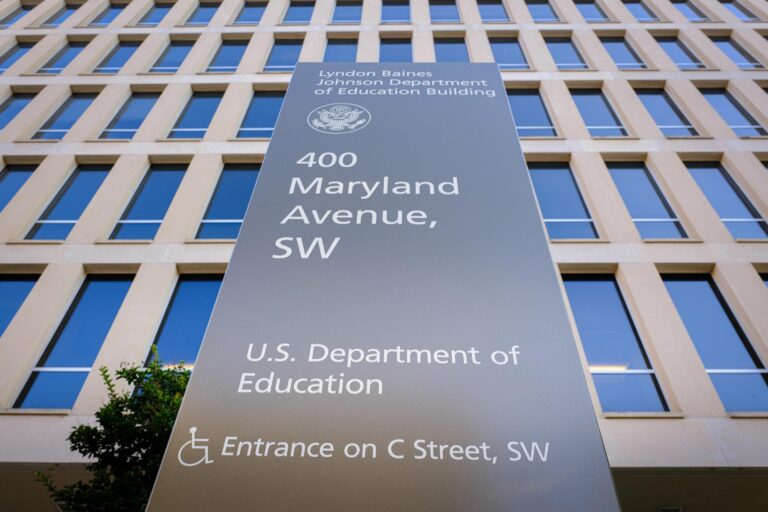Multi-State Legal Action Demands Release of Withheld Federal Education Grants
A coalition of 24 states has initiated a significant lawsuit against the Trump administration, contesting the suspension of more than $6 billion in federal education funding. These grants,intended to bolster vital educational initiatives,have been withheld amid disputes over regulatory compliance. State leaders contend that this freeze jeopardizes essential services in schools,including special education programs,facility improvements,and literacy efforts,all of which depend on timely federal support.
The legal challenge centers on several critical issues, with states demanding:
- The immediate release of the frozen grant money
- Defined schedules for future funding distributions
- Enhanced clarity in the management and allocation of grants
| State | Approximate Grant Amount | Primary Educational Priorities |
|---|---|---|
| California | $1.3B | Special Education & Literacy Programs |
| New York | $820M | School Facility Upgrades |
| Texas | $670M | Support for Economically Disadvantaged Students |
Consequences for Schools Dependent on Federal Funding
Educational institutions that rely heavily on federal grants are facing significant uncertainty due to the ongoing freeze of $6 billion in funds. Many districts,especially those serving underprivileged communities,utilize these resources to sustain programs such as special education,technology enhancements,and after-school activities. The absence of these funds forces school administrators to confront difficult choices, including staff reductions, curtailing student services, and postponing critical infrastructure projects necessary for compliance with federal standards.
Major repercussions for schools affected by the funding freeze include:
- Disrupted financial planning and delayed allocation of resources
- Potential layoffs or reduced working hours for teachers and support personnel
- Scaling back of enrichment and engagement programs for students
- Difficulty in fulfilling federally mandated educational requirements
| Funding Area | Effect of Grant Suspension | Examples of Impacted Programs |
|---|---|---|
| Special Education | Severe reductions | Occupational therapy, assistive technology |
| Technology | Postponed upgrades | Computer labs, internet connectivity |
| After-School Programs | Program cuts | Tutoring, sports and arts activities |
Legal Dispute Surrounding Federal Education Funding Freeze
The lawsuit filed by 24 states challenges the Trump administration’s decision to withhold over $6 billion in education grants, arguing that this action breaches federal laws requiring prompt distribution of funds to schools. The states claim the administration is leveraging the freeze to push unrelated policy objectives, thereby contravening congressional intent and threatening programs that serve vulnerable student populations.
Core legal arguments include:
- Noncompliance with federal appropriations statutes: The plaintiffs assert that the withholding violates the Elementary and Secondary Education Act, which mandates timely fund release.
- Adverse effects on students and schools: The states emphasize the tangible harm caused by the freeze, particularly to low-income and special education students.
- Judicial relief sought: The lawsuit requests a court injunction to compel immediate disbursement of the funds to prevent further damage during litigation.
| Issue | States’ Argument | Administration’s Response |
|---|---|---|
| Legality of Fund Freeze | Unlawful withholding of congressionally approved funds | Claims executive discretion over budget execution |
| Impact on Education | Harm to student programs and school operations | Ongoing procedural review justifies delay |
| Requested Court Action | Immediate release of frozen funds | Seeks dismissal based on policy considerations |
Strategies to Guarantee Timely Distribution of Education Grants
To prevent future interruptions like the current funding impasse, federal agencies should implement clear, standardized procedures that ensure prompt release of essential education funds. Policymakers must enforce clear allocation criteria to prevent administrative delays from withholding critical resources. Additionally,instituting automatic release mechanisms triggered by specific conditions could protect states from prolonged funding freezes,guaranteeing immediate access to allocated grants.
Strengthening oversight is equally vital. This could involve appointing independent auditors to track fund distribution and requiring regular progress reports from agencies responsible for grant management. Recommended actions include:
- Establishing statutory deadlines for fund disbursement post-approval
- Enhancing coordination among federal departments to reduce bureaucratic delays
- Developing a centralized digital platform for real-time grant tracking
- Creating emergency funding reserves to support schools during administrative delays
| Policy Initiative | Anticipated Benefit | Implementation Timeline |
|---|---|---|
| Mandate strict fund release deadlines | Minimized funding delays | Within 6 months |
| Launch digital grant monitoring systems | Increased transparency and accountability | Within 1 year |
| Form independent oversight committees | Enhanced compliance and oversight | Immediate |
Final Thoughts on the Education Funding Dispute
The ongoing legal confrontation over the $6 billion in frozen education grants highlights the complex dynamics between state governments and the federal administration. With nearly half the states united in challenging the Trump administration’s withholding of these funds, the case’s resolution will likely have far-reaching consequences for the future of education financing and federal-state collaboration. Educators, policymakers, and communities nationwide are closely monitoring the proceedings, hopeful that the funds will soon be released to support schools and students facing critical needs.




